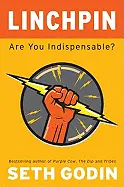
Linchpin - by Seth Godin
ISBN: 1591843162Date read: 2010-12-11
How strongly I recommend it: 5/10
(See my list of 360+ books, for more.)
Go to the Amazon page for details and reviews.
For someone who has a job at a company, I would call this essential reading with my highest recommendation. Since I haven't had a job since 1992, I couldn't apply many of his great points to my life. Still I loved his reminder of the value of the brilliant workers instead of systemized workers. The opposite of E-Myth (another book reviewed here).
my notes
A genius looks at something that others are stuck on and gets the world unstuck.
Start giving gifts that change people.
During times of change, the very last people you need on your team are well-paid bureaucrats, note takers, literalists.
The compliant masses don’t help so much when you don’t know what to do next.
What we must have are indispensable human beings. We need original thinkers, provocateurs, and people who care.
If you make your business possible to replicate, you’re not going to be the one to replicate it. Others will. If you build a business filled with rules and procedures that are designed to allow you to hire cheap people, you will have to produce a product without humanity or personalization or connection. Which means that you’ll have to lower your prices to compete. Which leads to a race to the bottom. Indispensable businesses race to the top instead.
Win by being more ordinary, more standard, and cheaper. Or win by being faster, more remarkable, and more human.
It’s factory work because it’s planned, controlled, and measured. It’s factory work because you can optimize for productivity. These workers know what they’re going to do all day—and it’s still morning.
If we can put it in a manual, we can outsource it. If we can outsource it, we can get it cheaper.
The only way to get what you’re worth is to stand out, to exert emotional labor, to be seen as indispensable, and to produce interactions that organizations and people care deeply about.
Gifts not only satisfy our needs as artists, they also signal to the world that we have plenty more to share.
Five traits that are essential in how people look at us: Openness, Conscientiousness, Extra-version, Agreeableness, and Emotional Stability.
Sandy Pentland is a researcher and professor at MIT. His latest work involves the ways that humans figure out what is really happening around them. His new book, Honest Signals, is named after his term for information that flows back and forth between people.
We have everything we need, so we’re not buying commodities. We’re not even buying products. We’re buying relationships and stories and magic.
Near the beginning of most comics was a scene where a stranger would meet the team.
Inevitably, the heroes would introduce themselves.
Of course, Batman or Superman wouldn’t need an introduction, but the lesser (lower-rent) heroes had to speak up and describe their superpowers.
“I’m the Wasp. I have the ability to shrink to a height of several centimeters, fly by means of insectoid wings, and fire energy blasts.”
Some fancy marketers might call this a positioning statement or a unique selling proposition.
Of course, it’s not that. It’s a superpower.
When you meet someone, you need to have a superpower. If you don’t, you’re just another handshake.
It’s not about touting yourself or coming on too strong. It’s about making the introduction meaningful.
If I don’t know your superpower, then I don’t know how you can help me (or I can help you).
When what you do is what you love, you’re able to invest more effort and care and time. That means you’re more likely to win, to gain share, to profit.
On the other hand, poets don’t get paid.
Even worse, poets who try to get paid end up writing jingles and failing and hating it at the same time.
Attention doesn’t always equal significant cash flow.
I think it makes sense to make your art your art, to give yourself over to it without regard for commerce.
Maybe you can’t make money doing what you love (at least what you love right now). But I bet you can figure out how to love what you do to make money (if you choose wisely).
Do your art. But don’t wreck your art if it doesn’t lend itself to paying the bills. That would be a tragedy.
--
John Jantsch took an interview he did with me (about forty minutes of audio) and posted it to a site that uses the Turk as its labor. For just a few dollars, the site took the recording, chopped it into tiny bits, and parceled it out to anonymous laborers who each transcribed their little section. Less than three hours later, it was sewn back together and the typed transcript was delivered to John. Instead of paying the industry rate of two dollars a minute (about eighty dollars), services like CastingWords do transcription for less than fifty cents a minute using the Turk.